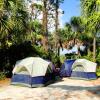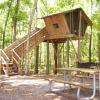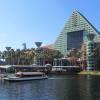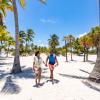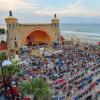By Julie Landry Laviolette
If you have a disability or are traveling with a loved one who has mobility, cognitive or emotional challenges, the Fort Lauderdale-Hollywood International Airport wants to make your travels a stress-free experience.
“We are always looking for and exploring ways to ensure that the airport is accessible to all travelers,” said Arlene Satchell, public information officer for the airport.
Arriving at the Airport
Let’s start with arriving at the airport. Did you know that if you need wheelchair assistance to get through security or go to your gate, you can request it from your airline? When you book a flight, simply ask by phone or add a wheelchair request when making an online reservation.
If you didn’t request it in advance, you can ask for a wheelchair when you get to the airport, but there may be a wait. “It's always best to request the service in advance,” Satchell said. “Demand is growing for the services, and you don't want to take a chance that at the last minute you are at the mercy of availability.”
If you have a power wheelchair, you can check it in at the gate, where it will be placed in the plane’s cargo hold. It will be returned to you when you reach your destination.
Accessible Parking
Accessible parking is available in all garages at every level.
If you have upper mobility issues that make it difficult to pull a parking ticket to get into the parking garage, the airport offers assistance. Linda Merrill, ADA Coordinator for Fort Lauderdale-Hollywood International Airport, said the parking attendant monitoring parking lot entrances will reach out to you by speakerphone, let you into the garage and take a picture of your vehicle’s license plate. When you leave the parking garage, the cashier will be able to determine the fee, she said.
From the Palm and Hibiscus garages, there are several different ways you can get to the terminal.
- Accessible trams have stops in both garages to get passengers closer to their terminals.
- Passengers can use elevators, which are located close to accessible parking, to crosswalks on the ground level to get to the terminals.
- There are pedestrian bridges from level four of the Palm Garage to Terminals 2, 3, and 4. From the second level of the Hibiscus Garage, a pedestrian bridge connects to Terminal 1.
- Accessible shuttles on the ground level travel between all terminals and the rental car center.
Free parking is available for Florida “Disabled Veteran” license plates, for vehicles with a Florida Toll Exemption Permit from the Florida Disabled Toll Permit Program, or vehicles that are permanently modified with special equipment such as foot controls, hand controls or motorized ramps.
Hidden Disabilities Sunflower Program
Not every disability is readily apparent. The Hidden Disabilities Sunflower Program helps travelers with non-visible disabilities discreetly let airport personnel know they may need a little more patience, a helping hand or simply more time.
Hidden disabilities can be physical, visual, auditory or neurological and range from autism, ADHD and cognitive impairments to physical conditions.
To participate, passengers wear a sunflower lanyard or pin while traveling through the airport. “It helps FLL employees to better identify and discreetly provide additional assistance where needed,” Merrill said.
You can request a lanyard or pin in advance of your trip by emailing contactfll@broward.org. Lanyards or pins will be mailed to you, so it’s best to make the request at least two weeks before your trip, Satchell said.
On a case-by-case basis, it may be possible to make an appointment to have someone meet you at the airport to give you a lanyard, Merrill said.
The Hidden Disabilities Sunflower Program was launched at Gatwick Airport in the United Kingdom in May 2016. It has since been adopted at many airports, hotels, railway stations and tourist destinations around the world.
TSA Cares
If you need extra time going through the TSA security checkpoints, request assistance through TSA Cares. The program helps travelers with disabilities, medical conditions and other special circumstances during the security screening process. Passenger Support Specialists can provide on-the-spot assistance.
“It's a wonderful program that doesn’t get enough recognition,” Merrill said. Contact TSA Cares at least 72 hours before you travel to be assigned a specialist to meet you at the airport. For example, if “a mother has a child who has autism and they need assistance, (a specialist) will help you through the process and get you through the checkpoint,” she said.
Nursing Rooms
The airport has six lactation suites (two ADA accessible) to give nursing mothers a quiet, private space to pump or breastfeed. To access a suite, download the Mamava app or call 954-359-1201.
The ADA suites are located in Terminal 1, post-security in Concourse A at the end of the moving walkway and in Terminal 3 near Concourse E’s security checkpoint.
Family Restrooms
If you have a disability and need assistance in the restroom, family restrooms are available throughout the terminals.
Pet-Relief Areas
The are six accessible pet relief areas, all with complimentary waste disposal bags:
There are four outdoor, accessible pet relief areas on the lower level, outside of each baggage claim area.
- Outside of Terminal 1 under the walkway from the garage
- Outside the Palm Garage across from Terminal 2
- Outside the Palm Garage across from Terminal 3
- Outside the Palm Garage across from Terminal 4
There are six indoor accessible pet relief areas.
- Terminal 1, B/C Connector
- Terminal 1, Concourse A
- Terminal 1, the U.S. Customs Federal Inspection Station
- Terminal 2, Concourse D
- Terminal 3, Concourse F
- Terminal 4, Concourse G
Accessible Transportation
If you need accessible transportation to or from the airport, you have a variety of options.
- Taxis - Yellow Cab can accommodate passengers with folding wheelchairs or provide wheelchair accessible vans at no additional charge. Advance notice is recommended. Contact Yellow Cab wheelchair taxi dispatch at 954-565-2800.
- Car rentals – Many car rental companies offer vehicles equipped with hand controls, with advance notice.
- Public transportation - Tri-Rail connector buses and Broward County Transit (BCT) buses accommodate riders in wheelchairs.
"Passengers can go straight to the ground transportation desk in the baggage area and request assistance," Merrill said. “They will show them where they can get a taxi or request a taxi that can accommodate a person in a wheelchair." Making advance arrangements is the easiest way, but they have availability on the premises as well.
Autism in Flight
Schoolchildren on the autism spectrum and their families learn about airline travel in the airport’s annual Autism in Flight program. For the past eight years, the airport has partnered with Broward County Public Schools, JetBlue, TSA and other agencies to help children with autism learn about the flying experience.
In the program, students, their family members and teachers come to the airport for a dress rehearsal of what it's like to fly, from going through a TSA security checkpoint to picking up a bag from baggage claim.
“It's essentially a simulated travel experience from check in to boarding a plane,” Satchell said.
Autism in Flight also is a wonderful awareness program for the airport community, Merrill said. Classes are held to help prepare the airline and TSA employees for the exercise.
ADA Access Committee
Merrill is part of an ADA Access committee that meets quarterly. “It's another opportunity to see the airport through the eyes of persons who use wheelchairs, are blind or hearing impaired or have a speech impediment,” she said. Committee members go through the terminal and TSA to make sure that agents know how to screen people with disabilities. After the exercise they meet with TSA staff to discuss how the process went.
Committee members also go through the terminal building to make sure that restaurants, retail outlets, restrooms and other public areas are ADA accessible, Merrill said.
AIRA App
Fort Lauderdale-Hollywood International Airport (FLL) offers complimentary access to a visual interpreting service for the blind or sight-impaired. When traveling through or visiting FLL, blind or low-vision individuals can take advantage of the Aira service to help create a more independent and accessible airport experience.
Through the free Aira mobile app, live trained agents provide real-time instructions and information to visually impaired travelers. The app connects to the user's cellphone camera, which streams video to an agent's computer dashboard to assist through reading and explaining to help the traveler navigate the airport efficiently, according to Aira. The agent also receives access to GPS, Google Maps, and ride-share services. With Aira, a traveler can adapt to changes quickly, such as a flight delay or gate change. The program also enhances wait time, allowing agents to direct users to available seating, specific amenities, and dining options, according to the company. Travelers can also receive assistance interpreting menus without relying on airport staff.
Information
Information booths through the airport are periodically staffed by volunteers, Satchell said. There also are ground transportation booths on the lower level of each terminal. “There, people can interact with uniformed staff to get their questions answered,” she said.


